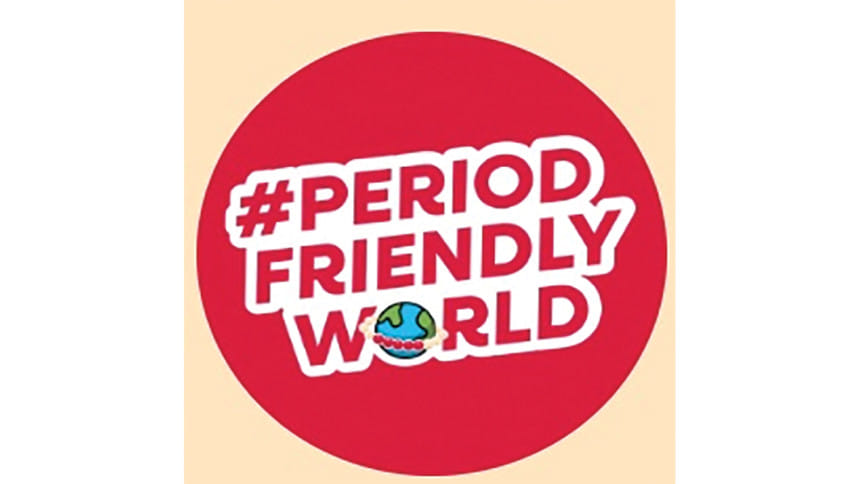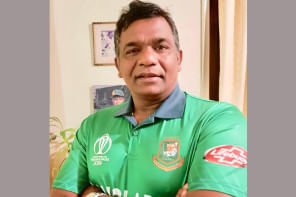A monthly struggle fought in silence

Three years ago, when 12-year-old Ayesha Begum got her first period, she thought she was dying.
Alone in a sweltering tin-roofed shack in Dhaka's Korail slum, she curled up under the bed -- frightened, confused, and unaware of what was happening to her body.
No one had ever explained menstruation to her -- not a teacher, not a health worker, not even her mother.
"I thought something was broken inside me," she said. "I didn't even know the word for it."
Her mother, Shahnoor Begum, a domestic worker, handed her a piece of old cloth after returning from work and simply said, "It happens to all girls."
In Dhaka's slums, menstruation is not seen as a natural biological milestone. It is endured as a recurring emergency -- shrouded in shame and compounded by poverty, inadequate sanitation, and social silence.
With clean water scarce, communal toilets shared by dozens of families lacking privacy, and menstrual products often unaffordable, managing a period becomes a monthly ordeal.
In Dhaka's slums, menstruation is not seen as a natural biological milestone. It is endured as a recurring emergency -- shrouded in shame and compounded by poverty, inadequate sanitation, and social silence.
As the world marks Menstrual Hygiene Day today (May 28) under the theme "Together for a #PeriodFriendlyWorld," the lived experiences of girls like Ayesha reveal how far Bangladesh's urban poor remain from that goal.
To avoid changing clothes during the day, Ayesha layers damp rags and secretly washes her soiled clothes in limited water when no one is around.
"There's nowhere proper to dry them, so I hang them behind the stove," she said. "They stay damp and smell bad. It's hard to maintain proper hygiene like this."
The consequences are predictable -- rashes, irritation, infections, and long-term reproductive health issues.
Each month, Ayesha suffers severe cramps, worsened by the repeated use of unsanitary clothes.
"I feel sick. I vomit. I miss school," she said. Her mother can only offer warm water for relief.
Such experiences are far from isolated. The 2018 National Hygiene Survey found that only one-third of Bangladeshi women knew about menstruation before their first period.
In low-income settlements, where access to education and healthcare is limited, the figure is likely even lower. Generations of silence and misinformation have left thousands of girls unprepared and unsupported.
Last year, 13-year-old Rina Akhter of Kalyanpur slum got her period unexpectedly just before class.
With no sanitary pads at home, she folded two sheets of newspaper and placed them in her underwear -- an unreliable improvisation her mother had once taught her out of necessity.
"I was too scared to ask to go to the toilet -- it's filthy and there's never any water," she said. The blood soaked through her school uniform. Boys laughed.
"I froze. I just ran home crying."
Her mother, Shahida Akter, a garment worker, repeated what she herself had once been told: "It's natural. It happens to all girls."
"But the truth is, I didn't know how to help," Shahida admitted. "No one ever helped me either."
Raised in a village in Mymensingh, Shahida has never used a sanitary pad. She managed her own periods with torn sari cloth, washed in secret. "We didn't talk about it. We just endured it."
Now Rina does the same. She washes clothes at night in cold water, using a bit of detergent if available. There is no hot water, no disinfectant, and hardly any sunlight to dry them.
"I dry them under the bed, sometimes behind the food rack or under other clothes," she said. "They smell bad, but I don't have another option."
Like Ayesha and Rina, many girls rely on cloth -- less by choice and more by necessity.
A 2024 UNFPA study found that 22 percent of adolescent girls under 17 in urban slums use cloth as their primary menstrual product. None of the study's participants had heard of tampons or menstrual cups.
Even disposable pads -- considered a basic necessity -- are often out of reach.
"I buy one pack a month if we have extra money," said Rina. "Otherwise, it's back to rags."
For 16-year-old Sumi Akter in Dhaka's Tejgaon slum, pads are an unattainable luxury. She uses torn cloth, washed in secret and dried behind furniture in the dark.
"There's no soap, no sun," she said.
The shared toilet has no bins, no running water, and no guarantee of safety, with boys often loitering nearby. Most of the time, she has only a single wash jug -- or bodna -- of water to manage her menstrual hygiene.
Globally, an estimated 500 million women and girls lack access to proper menstrual hygiene products and facilities, according to a 2022 World Bank report.
In Bangladesh, WaterAid's ongoing project "Stop the Stigma: Empowering Menstruating Girls in Bangladesh" (2022–2025) found that 94 percent of women and girls lack adequate menstrual knowledge.
This knowledge gap is evident in schools, where poor menstrual hygiene leads to up to 40 percent absenteeism among girls.
According to the project, 31 percent of teachers report a drop in academic performance during menstruation, while 32 percent of girls avoid school toilets altogether.
Sharmin Kabir, founder of Wreetu Health and Well-being Foundation -- which provides menstrual health education in slums -- has seen these challenges firsthand.
"Menstruation is still treated as shameful," she said. "Most families don't have private toilets. Girls wait until dark to use them, risking harassment just to fetch water."
Sharmin emphasised that using cloth is not inherently unhygienic -- but when girls don't have safe washing and drying conditions, the risks rise. Even disposable pads can pose problems when girls lack knowledge about safe disposal.
Still, there is hope.
"Many adolescent girls want to manage their periods safely," she said. "We've seen a growing demand for reusable pads. They're open to learning."
She believes that the involvement of both government and the private sector is key. Investments in menstrual education, accessible products, and gender-inclusive infrastructure can transform the issue.
"This isn't just a women's issue," Sharmin said. "It's a public health issue. A development issue. And above all, a matter of dignity."
Focusing on the infrastructural challenges of menstrual hygiene management (MHM) in Dhaka's slums, Partha Hafez Shaikh, director (programme and policy advocacy) at WaterAid, said, "Infrastructure can be built and funded, but long-term maintenance is essential. Latrines and toilets must be regularly cleaned and maintained. To sustain improvements, we must invest in building the community's capacity to manage and maintain these services."
He also emphasised the need to involve boys and men in MHM, noting that menstrual health should not be seen solely as a women's issue. "Lasting change requires the engagement of the entire society," he said, pointing out that broader social transformation and true inclusivity remain lacking.
"There are clear issues of safety and privacy in the slums, particularly for women and girls," he added. "We are working with the city corporation, the legal authority of the slums, and Wasa to improve water and sanitation infrastructure --with a strong focus on gender-sensitive planning."


 For all latest news, follow The Daily Star's Google News channel.
For all latest news, follow The Daily Star's Google News channel. 



Comments